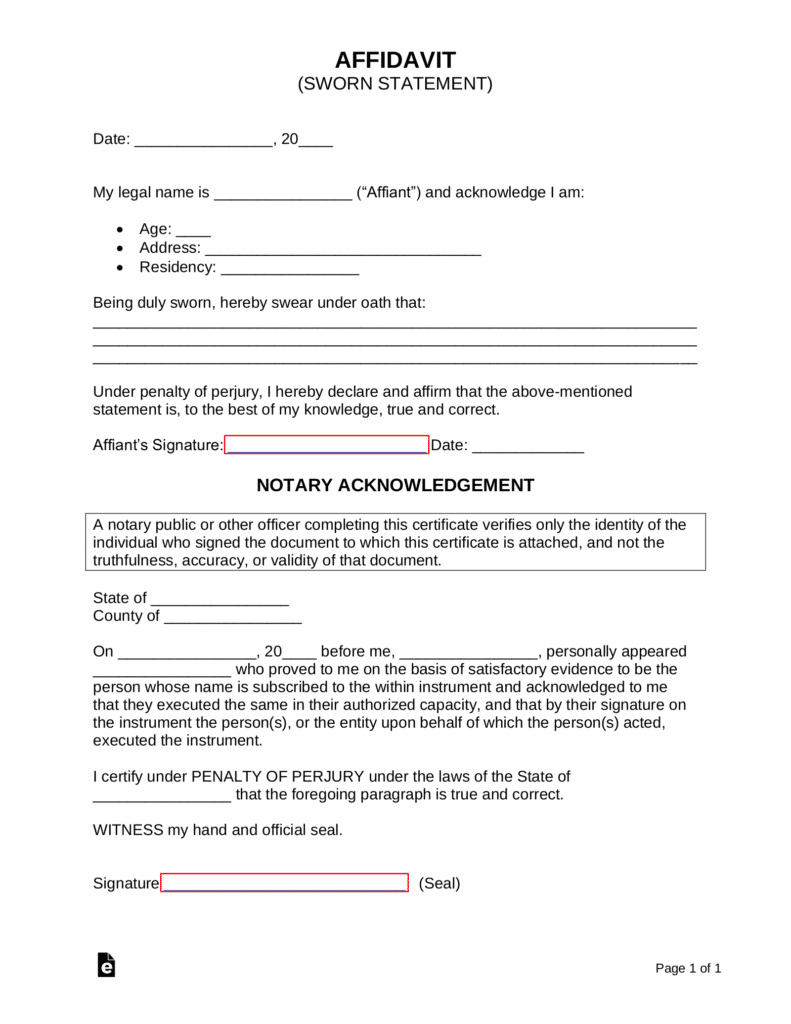What is an Affidavit?
An affidavit is a legally-binding document containing facts from an individual who believes them to be true and accurate. They are so popular, that according to the National Center for State Courts (NCSC), affidavits appear in over 90% of civil cases in the United States as supporting documents.
Affidavits are used across many scenarios and situations to prove certain information or issues occurred. To find out more about these standard documents that pop up in our everyday lives, join us in the article below.
Let’s get started!

Purpose of an Affidavit
Organizations will sometimes require affidavits to prove that an individual providing certain facts are TRUE. This person is referred to as the affiant, and they will be the one to create an affidavit. Whatever they add to the document can be used as evidence in legal proceedings. Therefore, the affiant should only add accurate facts into an affidavit.
Since this document can be used in legal matters, the structure of an affidavit must be formal and provide factual information to readers.
What is an Affidavit Used for?
We already mentioned that affidavits can be used as evidence in legal settings. To explain further, they can appear as written testimonies and be provided in court cases so that the affiant does not need to attend. Although there are many more use cases, we will share one more today. Affidavits make great supporting documents. They are legally binding files, so they can be used to aid the following in debates:
- Applications
- Motions
- Petitions
What Needs to Be in an Affidavit?
Affidavits have a formal structure and need to ensure that the information they carry is true and accurate. To make sure affidavits can be used to confirm the authenticity of statements, add these items to your document:
- A Title
- Personal Information of the Affiant
- A Statement of Truth
- The Facts
- Signature of the Affiant
- The Date
- Signature of a Notary or Commissioner of Oaths
- Any Attachments or Exhibits, if Necessary
- A Closing Statement
- A Jurat
Who Signs an Affidavit?
From the affidavit requirements listed above, we see that the document needs multiple signatures. First, the document needs a signature from the affiant. This signature is placed at the end of the document to show that the affiant promises that the statements made in the affidavit are true.

It has to be Notarized
Next, the affidavit requires a signature from a notary public or a commissioner of oaths, but the affiant will sign the affidavit first. This will ensure that the notary public or commissioner of oaths has witnessed the signing in action. Then, the notary public or commissioner of oaths will add their signature, official seal, and the notarization date to the affidavit.
Read our How to Notarize a Document for more information on this topic.
Affidavit Requirements:
We provided the basic essentials you need in an affidavit, but what about the not-so-common ones? Let’s take a look at a requirement that is not discussed often.
It has to be Voluntary
An affidavit can only be legally valid if the affiant has made it voluntarily. This means that they have created the document willingly. For example, the affiant needs to have crafted the document without:
- Force from other individuals.
- Threats from people.
- Impact from their environment.
Example of an Affidavit
“How does an affidavit work?” you might ask. Well, we believe a picture is worth a thousand words, so here is an example of an affidavit you can find in the real world.

Generate & Sign Your Affidavit with Titan
If you want to create an easy affidavit process from start to finish that is super efficient, we recommend you check out Titan Docs. Our app will allow you to generate documents with e-signature fields from Salesforce to deliver to your clients. The best part about Titan Docs is that you can work with your favorite apps, like Microsoft Word while using NO code to eliminate errors in your documents and Salesforce database.
For more information about our point-and-click Salesforce document generation tools, contact us through one of our social media channels below.
See you soon!

Disclaimer: The comparisons listed in this article are based on information provided by the companies online and online reviews from users. If you found a mistake, please contact us.
Frequently Asked Questions
Why an Affidavit is Not Evidence?
It could be treated as less important material in legal matters when compared to other types of verification, like physical evidence or testimonies delivered in person.
Who is the Affiant in an Affidavit?
That would be the individual who writes a statement in an affidavit. They are also responsible for signing the document to confirm that the content in the affidavit is true and accurate.
What is Another Word for Affidavit?
You could use the term sworn statement.
Can an Affidavit be Used as a Will?
No, these are two different types of legal documents. An affidavit is a document containing details to confirm various facts are true. A will, on the other hand, is a document that contains an individual’s wishes on how they would like their assets to be distributed.
